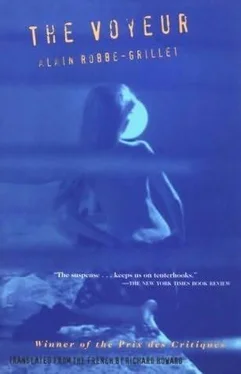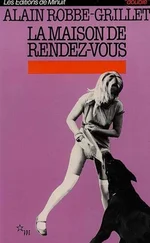The body had been brought to Madame Leduc’s house, along with two or three pieces of the girl’s clothing that had been scattered on the nearby rocks, among the seaweed. According to his informant, Madame Leduc had actually grown “rather calm” on learning what had become of her youngest daughter and the reason that had kept her from coming home. No one who witnessed the scene was surprised.
His audience—five other sailors, the proprietor, and the young barmaid—had listened to the entire account without once interrupting, merely nodding at the most decisive passages. Mathias contented himself with imitating them.
There was a pause at the end. Then the hospital attendant repeated elements of his story from first one part, then another, employing the same terms and constructing his sentences in the identical manner: “The hookers had already begun to nibble at the tenderest parts: the lips, the neck, the hands… other places too…. Only just begun, though: almost nothing. Or else it might have been a red eel, or a barbel…”
At last, after another silence, someone said: “It’s the devil that finally punished her!”
It was one of the sailors—a young one. Several murmurs rose around him—vague sounds, signifying neither acquiescence nor protest. Then everyone was still. On the other side of the glass door, beyond the cobbles and the mud, the water of the harbor was gray, flat, and lusterless. The sun had not reappeared.
Someone spoke up behind Mathias: “Maybe she was pushed—did you ever think of that—to make her fall…. She was fast on her feet, that girl.”
This time the silence was longer still. The salesman turned around to face the room and searched every face to discover who had just spoken.
“Anyone can lose his balance,” the hospital attendant said.
Mathias emptied his glass and set it down again on the counter.
He looked at his right hand on the edge of the counter, next to the empty glass, and immediately concealed it in his duffle coat pocket. There it came in contact with the open pack of cigarettes. He took one out of the pack, still in his pocket, then put it in his mouth and lit it.
The smoke, expelled through his rounded lips, formed a great circle above the bar, slowly twisting in the calm air into two equal loops. As soon as possible Mathias would ask his landlady for a pair of scissors to cut these embarrassing nails; he did not want them to be this long for two days more. It was at that moment that he first remembered the three cigarette butts left on the cliff, in the grass, under the crossroads.
There was no harm in taking a little walk; after all, he had nothing else to do. The trip there and back would take an hour, an hour and a half at the most—he would easily be back for lunch—the visit to his old friends the Mareks—he had not found them at home the day before.
Once again he was at the bottom of the little depression, in the hollow sheltered from the wind. At least he thought he recognized it; but his recollection of it differed slightly from what was now before his eyes. The fact that the sheep were no longer there was not enough to account for the change. He tried to imagine the bicycle lying on the weeds, gleaming on the sunny slope. But the sun was missing too.
Moreover he could not find the slightest trace of a cigarette. Since all three had been only half-smoked, some passer-by might have picked them up last night or this morning. A passer-by! Nobody passed by in a place as remote as this—unless it happened to be the people looking for the lost shepherdess.
He glanced once more at the grass underfoot, but he no longer considered such matters important: on the island as elsewhere, everyone smoked the same brand of cigarettes—the ones in the blue pack. Nevertheless, Mathias kept his eyes on the ground. He saw the little shepherdess lying at his feet, feebly twisting from side to side. He had wadded up her shift and stuffed it into her mouth to keep her from screaming.
When he looked up again, he realized he was not alone. That was why he had looked up. Standing on the ridge fifteen or twenty yards away, a delicate silhouette was etched against the gray sky: someone was standing there, motionless, watching him.
For an instant Mathias imagined he was seeing little Jacqueline all over again. And just as he realized the absurdity of such an apparition, he noticed that the newcomer was several inches taller and several years older than she. Scrutinized carefully, moreover, this face bore no resemblance to Violet’s, although it too was not unfamiliar to him. Soon he remembered: it was the young woman who lived at Jean Robin’s, in the cottage at the mouth of the cove.
He walked toward her—deliberately—almost without moving. Her dress—like that of almost all the island girls—was merely a simplification of the ancient regional costume: thin, long-sleeved, and black, rather close-fitting from shoulders to hips, with a wide skirt; the rounded collar exposed the neck; the girl’s hair was arranged in two short braids, one on each side of a part beginning at the nape of her neck; the braids were coiled into little buns concealing the upper part of her ears. The little girls wore practically the same dress, but much shorter and usually without sleeves; they wore their hair in the same way too, but without coiling the braids into buns.
When they went out-of-doors, the island women left their narrow, bright-colored aprons at home and wrapped big fringed shawls around their shoulders. Yet this girl wore neither apron nor shawl, nor any other outer clothing, although Mathias was wearing a duffle coat without discomfort in such weather. On the windblown ridge toward which he was walking she had to hold the folds of her skirt in one hand to keep it from rising. She half turned her head away from him, as if surprised in some misconduct.
“Hello,” said Mathias. “…Taking a walk?”
“No,” she said. And then, after a few seconds, “It’s all over.”
He had not noticed, yesterday, how deep her voice was. In fact he did not recall having heard her speak a word. She was rather short—as soon as their respective positions did not force him to look up at her from below, she barely reached to the salesman’s shoulder.
“It’s not so nice out this morning,” he said.
She suddenly lifted her head, stepping back at the same time. Her eyes were red, as if she had been crying for some time. She cried out, her voice surprisingly low: “What are you looking for around here? You know perfectly well he killed her!”
And she turned her face away again, bending her neck. The fine scratch, half-scabbed over, must have opened again; the edge of lier dress, as it moved, smeared a little blood over the surface of her skin.
“‘He?’ Who?” asked Mathias.
“Pierre.”
“Which Pierre?”
“Pierre, your friend!” she said impatiently.
Then Jean was not his name? Nor Robin either, perhaps? It was not his name written on the door panel.
She straightened up and said more calmly: “Still, it’s a good thing I met you.” She raised the hem of her left sleeve and removed the wrist watch beneath it—the present Mathias had given her. “I had to return this.”
“You don’t want it any more?”
“I have to give it back to you.”
“Well, if you have to.”
“He’ll kill me… the way he killed Jackie…”
“Why did he kill her?”
The girl shrugged her shoulders.
“He’ll kill you if you keep the watch?” Mathias asked.
She turned her eyes away again: “He said you told me.… He said he had heard you.”
“Heard what?”
“What you told me.”
“And what did I tell you?”
“I don’t know.”
Mathias took the watch she held out to him and put it in his pocket. “Why did he kill her?” he asked.
Читать дальше












